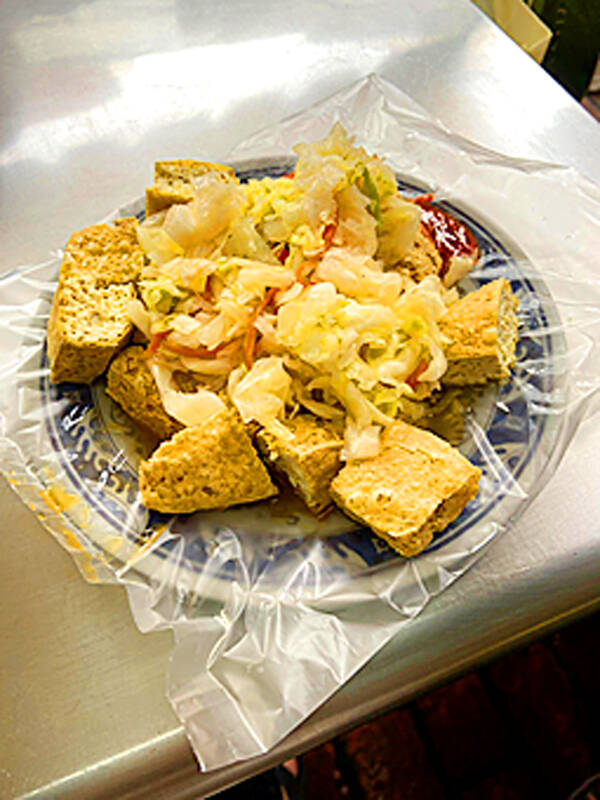If we were to talk about the least popular Taiwanese street food among foreign tourists, stinky tofu would definitely be at the top of the list. Walking through Taiwan’s night markets, even before finding a vendor selling it, you will first be hit by a strong odor. Stinky tofu is fermented soybean tofu which has a strong odor and is often deep-fried and seasoned with chili sauce or thickened soy sauce.
說到最不受外國遊客歡迎的台灣小吃,臭豆腐絕對是名列前茅。走在台灣夜市,還沒找到臭豆腐攤,強烈的氣味就先找上門。臭豆腐是將豆腐發酵製成,氣味強烈,通常以油炸烹調,搭配辣椒醬和醬油膏享用。
fermented (adj.) 發酵的

Photo: Bookman 圖片:書林
soybean (n.) 黃豆
Some people are repelled by the pungent smell of stinky tofu, but many others believe that the stronger the smell, the better it tastes. They like to pair it with the sweet pickled flavor of Taiwanese-style pickled vegetables while eating it. Unlike Korean kimchi, Taiwan’s version is not pickled for as long, preserving the crispness of the vegetables. The sweetness balances the strong flavors of stinky tofu and enriches the overall taste of the dish.
有的人聞到臭豆腐的臭味即敬而遠之,但也有人認為聞起來越臭,嘗起來味道愈好。愛吃臭豆腐的人吃的時後會搭配台式泡菜,其醃漬時間不如韓式泡菜長,保留蔬菜爽脆的口感,泡菜的甜味還可平衡發酵味,讓滋味更豐富。
kimchi (n.) 韓式泡菜
pickle (v.)(用醋或鹽水)醃漬
In addition to the commonly seen deep-fried stinky tofu, Taiwan also has charcoal-grilled and steamed versions. When it comes to determining the best version, there will be an ongoing debate among Taiwanese people depending on their personal preferences. Deep-fried stinky tofu is crispy and has a milder fermented flavor, making it more suitable for foreigners trying stinky tofu for the first time. If you enjoy a smoky taste, you might appreciate charcoal-grilled stinky tofu with a slightly charred exterior basted with barbecue sauce. Or if you prefer a soft tofu texture, steamed stinky tofu may be to your liking. However, please note that of the three types of stinky tofu, steamed stinky tofu has the strongest odor.
除了常見的炸豆腐,還有炭烤和清蒸等料理方式,若要說哪一種最好吃,台灣人會因各有所好而爭論不休。炸臭豆腐嘗起來酥脆,發酵味較淡,適合初嘗臭豆腐的外國人。炭烤臭豆腐帶有炭火的香氣,刷上烤肉醬,外皮微焦。偏好豆腐軟嫩口感的,也可以選擇清蒸臭豆腐,但要注意,清蒸臭豆腐可是以上幾種中最臭的。
Stinky tofu was invented in the Qing Dynasty by Wang Zhihe, an intellectual who had traveled a long way to the capital Beijing to take the imperial examination. He failed it and ran out of money, so he decided to stay in Beijing to prepare for the following year’s exam. To support himself, he started a business selling tofu. One day, there was a large pile of unsold tofu in the store. He cut it into pieces, cured it with salt, and stored it in a jar. A few busy months later, when he opened the jar, the tofu, rather than being properly cured, had fermented and was giving off a strong odor. Reluctant to waste the unsold tofu, he tasted it and discovered that despite its pungent smell, the tofu tasted delicious. This inspired him to sell it in his store, where it quickly gained popularity. Even Empress Dowager Cixi (1835–1908 CE) loved its taste. Stinky tofu eventually spread overseas to Taiwan where to this day we enjoy eating this smelly dish.
臭豆腐是清朝文人王致和所發明,他為進京赴考用盡盤纏,卻名落孫山,為了再次應試,便在京城賣起豆腐。有天店裡有一大堆豆腐沒賣掉,於是決定加點鹽放在罐子中醃製。數個月後他打開罐子,豆腐沒醃製成,反而發酵發臭了。他捨不得丟嘗了一口,卻沒想到臭掉的豆腐還挺美味,於是改行賣起臭豆腐,迅速大受歡迎,連慈禧太后(西元1835–1908年)都愛吃,甚至遠播台灣。直至今日,這道奇臭無比的美食依舊深受台灣人民喜愛。
imperial examination (n. phr.) 科舉
cure (v.) 鹽醃
Empress Dowager Cixi 慈禧太后
dowager (n.) 繼承財產、爵位的遺孀
smelly (adj.) 有臭味的,發臭的
文章由書林出版公司提供:
www.bookman.com.tw

In an effort to fight phone scams, British mobile phone company O2 has introduced Daisy, an AI designed to engage phone con artists in time-wasting conversations. Daisy is portrayed as a kindly British granny, exploiting scammers’ tendency to target the elderly. Her voice, based on a real grandmother’s for authenticity, adds to her credibility in the role. “O2” has distributed several dedicated phone numbers online to direct scammers to Daisy instead of actual customers. When Daisy receives a call, she translates the scammers’ spoken words into text and then responds to them accordingly through a text-to-speech system. Remarkably, Daisy

Bilingual Story is a fictionalized account. 雙語故事部分內容純屬虛構。 Emma had reviewed 41 resumes that morning. While the ATS screened out 288 unqualified, she screened for AI slop. She could spot it a mile away. She muttered AI buzzwords like curses under her breath. “Team player.” “Results-driven.” “Stakeholder alignment.” “Leveraging core competencies.” Each resume reeked of AI modeling: a cemetery of cliches, tombstones of personality. AI wasn’t just changing hiring. It was draining the humanity from it. Then she found it: a plain PDF cover letter. No template. No design flourishes. The first line read: “I once tried to automate my

Every May 1, Hawaii comes alive with Lei Day, a festival celebrating the rich culture and spirit of the islands. Initiated in 1927 by the poet Don Blanding, Lei Day began as a tribute to the Hawaiian custom of making and wearing leis. The idea was quickly adopted and officially recognized as a holiday in 1929, and leis have since become a symbol of local pride and cultural preservation. In Hawaiian culture, leis are more than decorative garlands made from flowers, shells or feathers. For Hawaiians, giving a lei is as natural as saying “aloha.” It shows love and

1. 他走出門,左右看一下,就過了馬路。 ˇ He walked outside, looked left and right, and crossed the road. χ He walked outside and looked left and right, crossed the road. 註︰並列連接詞 and 在這句中連接三個述語。一般的結構是 x, y, and z。x and y and z 是加強語氣的結構,x and y, z 則不可以。 2. 他們知道自己的弱點以及如何趕上其他競爭者。 ˇ They saw where their weak points lay and how they could catch up with the other competitors. χ They saw where their weak points lay and how to catch up with the other competitors. 註:and 一般連接同等成分,結構相等的單詞、片語或子句。誤句中 and 的前面是子句,後面是不定詞片語,不能用 and 連接,必須把不定詞片語改為子句,and 前後的結構才相等。 3. 她坐上計程車,直接到機場。 ˇ She took a cab, which took her straight to the airport. ˇ She took a cab and it took her straight